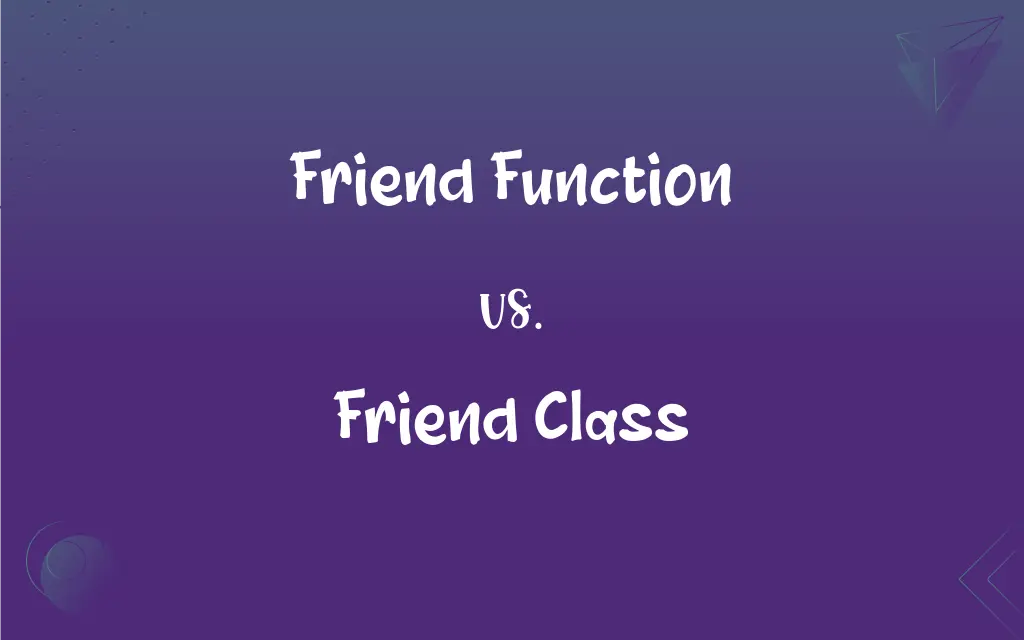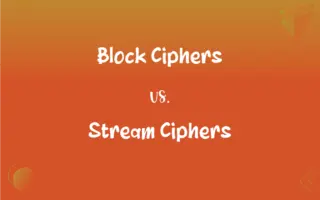Friend Function vs. Friend Class: What's the Difference?
Edited by Harlon Moss || By Janet White || Published on February 1, 2024
A friend function is a non-member function with access to private and protected members of another class, whereas a friend class has access to these members of another class.

Key Differences
A friend function in C++ is a function declared with the friend keyword inside a class, allowing it to access private and protected members of that class. It is not a member function but can access the class's internal members. Conversely, a friend class is a class declared as a friend of another class, which permits all member functions of the friend class to access the private and protected members of the other class.
Friend functions are typically used when two or more classes need to interact closely, such as operator overloading. These functions can be declared anywhere in the program but are not considered members of the class. Friend classes, however, are used when one class needs extensive access to another's internals, often seen in cases where classes are tightly coupled.
a friend function has a specific, limited purpose, accessing certain private data of the class. A friend class, in contrast, provides a broader access level, allowing all its member functions to access the private data of the associated class.
Implementing a friend function does not affect the encapsulation of the class as it only accesses what is necessary. In the case of a friend class, encapsulation can be more significantly impacted since an entire class is given potential access to another class's private and protected members.
In terms of design, a friend function is considered a better choice when minimal access is needed, ensuring more controlled and maintainable code. A friend class, while powerful, should be used judiciously to avoid overexposing the internal details of a class, which could lead to maintenance challenges.
ADVERTISEMENT
Comparison Chart
Definition
Non-member function with special access rights.
Class with access to another class's private data.
Access Scope
Specific functions accessing private data.
All member functions can access private data.
Typical Use
Operator overloading, utility functions.
Tightly coupled class relationships.
Impact on Encapsulation
Limited, controlled access.
Broad, potentially overexposing private data.
Implementation Consideration
Used for specific, limited access needs.
Used when extensive access is necessary.
ADVERTISEMENT
Friend Function and Friend Class Definitions
Friend Function
Not a member, but has access like a member function.
Friend bool isEqual(MyClass obj1, MyClass obj2);
Friend Class
Used to establish a close relationship between two classes.
Class Config { friend class ConfigManager; };
Friend Function
A friend function can access private members of a class.
Friend void showData(MyClass obj);
Friend Class
A friend class can access private and protected members of another class.
Class MyClass { friend class FriendClass; };
Friend Function
Used for operations that require access to class's internals.
Friend MyClass operator+(MyClass obj1, MyClass obj2);
Friend Class
It allows another class to interact closely with its internals.
Class Accessor { friend class Container; };
Friend Function
Enables external functions to operate on private class data.
Friend void resetCounter(MyClass& obj);
Friend Class
All member functions of a friend class can access the target class's private data.
Class Data { friend class DataProcessor; };
Friend Function
It's declared in the class but defined outside.
Friend int add(MyClass obj);
Friend Class
Grants extensive access to another class for cooperation.
Class Editor { friend class EditorState; };
FAQs
What is a friend function in C++?
A non-member function granted access to a class's private and protected members.
Why use a friend function instead of a member function?
For functionality that requires access to class internals but doesn't logically belong to the class.
Is a friend class a member of another class?
No, it's a separate class with special access privileges.
What does a friend class do?
It allows one class to access another class's private and protected members.
How do you declare a friend function?
By using the friend keyword inside the class declaration.
Do friend functions violate encapsulation?
They can, but if used judiciously, they provide necessary access without significantly breaking encapsulation.
Can friend functions be overloaded?
Yes, like regular functions, friend functions can also be overloaded.
How does a friend class affect class design?
It can lead to tighter coupling between classes, which should be managed carefully.
Can constructors and destructors be friend functions?
Yes, constructors and destructors can be declared as friend functions.
How many friend classes can a class have?
A class can have any number of friend classes.
Can a friend function be virtual?
No, friend functions are not member functions and cannot be virtual.
Can a friend class access private members of another class?
Yes, it can access all private and protected members of the other class.
Are friend relationships transitive?
No, if Class A is a friend of Class B, and Class B is a friend of Class C, Class A is not automatically a friend of Class C.
What's the main difference in usage between friend functions and friend classes?
Friend functions are for specific operations, while friend classes are for extensive cooperation between two classes.
Is there a limit to the number of friend functions a class can have?
There is no explicit limit to the number of friend functions a class can declare.
Can a friend function access static private members of a class?
Yes, friend functions can access both static and non-static private members.
Is it possible to declare a friend function within the class body?
Yes, a friend function can be declared within the class body, but its definition must be outside.
Does a friend function have access to private members of all instances of a class?
Yes, a friend function can access private members of any instance of the class.
Can a friend class be a template class?
Yes, a template class can be declared as a friend class.
Are friend declarations inherited in C++?
No, friend declarations are not inherited in derived classes.
About Author
Written by
Janet WhiteJanet White has been an esteemed writer and blogger for Difference Wiki. Holding a Master's degree in Science and Medical Journalism from the prestigious Boston University, she has consistently demonstrated her expertise and passion for her field. When she's not immersed in her work, Janet relishes her time exercising, delving into a good book, and cherishing moments with friends and family.
Edited by
Harlon MossHarlon is a seasoned quality moderator and accomplished content writer for Difference Wiki. An alumnus of the prestigious University of California, he earned his degree in Computer Science. Leveraging his academic background, Harlon brings a meticulous and informed perspective to his work, ensuring content accuracy and excellence.







































































